The Hemp Revolution is Being Powered by Brand Awareness: HempAware
Who knew a plant could initiate such a lot of dialogues? Hemp seeps into the conversation these days in family dinners, co-working environments, and coffee shops. When you remove the layers, though, it’s about individuals waking up to possibilities rather than just one plant. Though it sounds simple, becoming “hemp aware” involves a lot going on behind the surface.

Brand awareness is not only a marketing buzzword thrown at corporate conferences. The subtle change is when a buddy asks about your hemp-based protein smoothie or notes your hemp tote. Curiosity takes the stage instead of doubt suddenly. The dominoes start to fall at that point.
Go for a walk to your neighborhood market for farmers. See the merchants gently teaching consumers on how hemp seed oil might replace less environmentally friendly substitutes. They simply share stories; they are not pressuring. Being hemp conscious is noticing the hemp label and connecting it right away with something beneficial for the earth. It’s like putting a small flag for environmental friendliness, ingenuity, even wellness in people’s heads.
Small companies are riding this fresh vitality. Their Instagram feeds now feature the “why” behind things rather than only highlights of them. A hemp skincare company might give a behind-the-scenes view of their procurement. People purchase a face cream, but they also buy into a narrative that appeals to their heart chords and helps them feel a part of something greater than themselves.
Naturally, there is also a little friendly rivalry. Companies compete with packaging that shouts “natural,” certificates stacked like prizes, educational materials more like a zine than an advertisement. It’s producing. People are changing from reluctant consumers to devoted champions. Some even start evangelists, bringing biodegradable traits or minimal water footprint data on hemp into every discussion.
But more exists. Hemp teaching is being included into sustainability courses in schools. Hemp activities sponsored by councils bring inquisitive people together. Awareness of hemp permeates social groups and finds its way into popular culture gradually but definitely. It shapes government dialogue as well. Policy changes an inch when emails from legislators with cannabis awareness clutter their inbox.
The “hemp revolution” is about a mental switch turning on someone, not about a product finding shelves. That flashbulb moment when people link the dots: reduced waste, better choices, new business ideas. The wave began with a whisper. A neighbor suggests hempcrete for domestic building projects. By mistake, someone finds hemp milk to be delicious. One choice leads to another, and unexpectedly the revolution isn’t some far-off dream—it’s right here, silently expanding but acquiring strength.
Thus, when someone discusses being “hemp aware,” they are not only honoring the plant. They are embracing a change, a hint to mindful, forward-looking life and maybe some rebellious hope. That’s the magic. That is how awareness transforms an ordinary harvest into a movement that will not stop.
